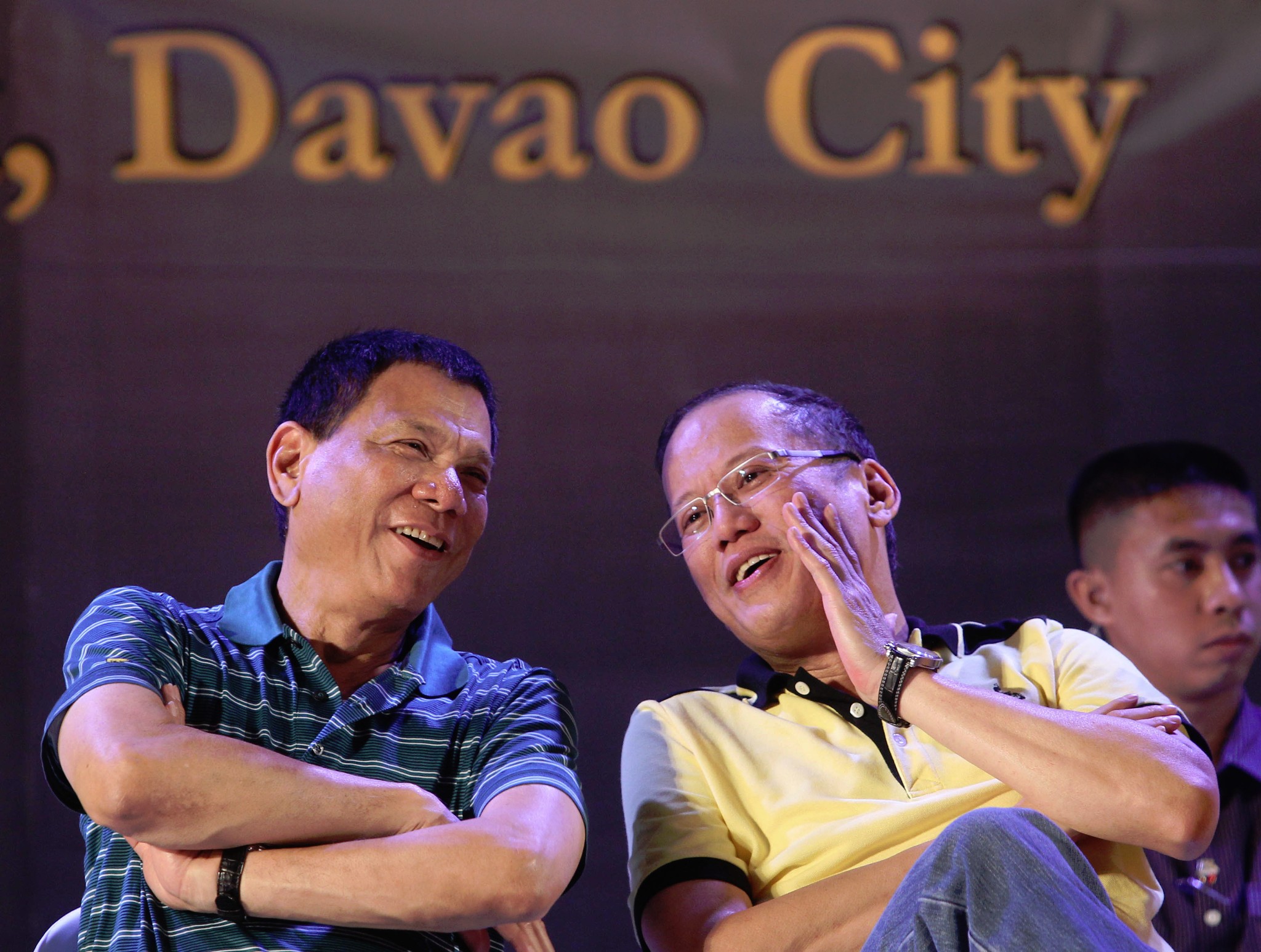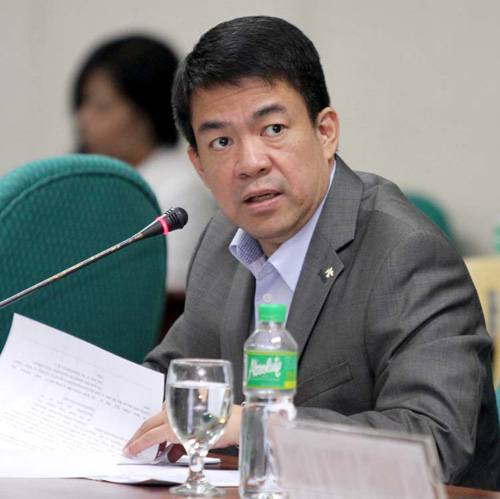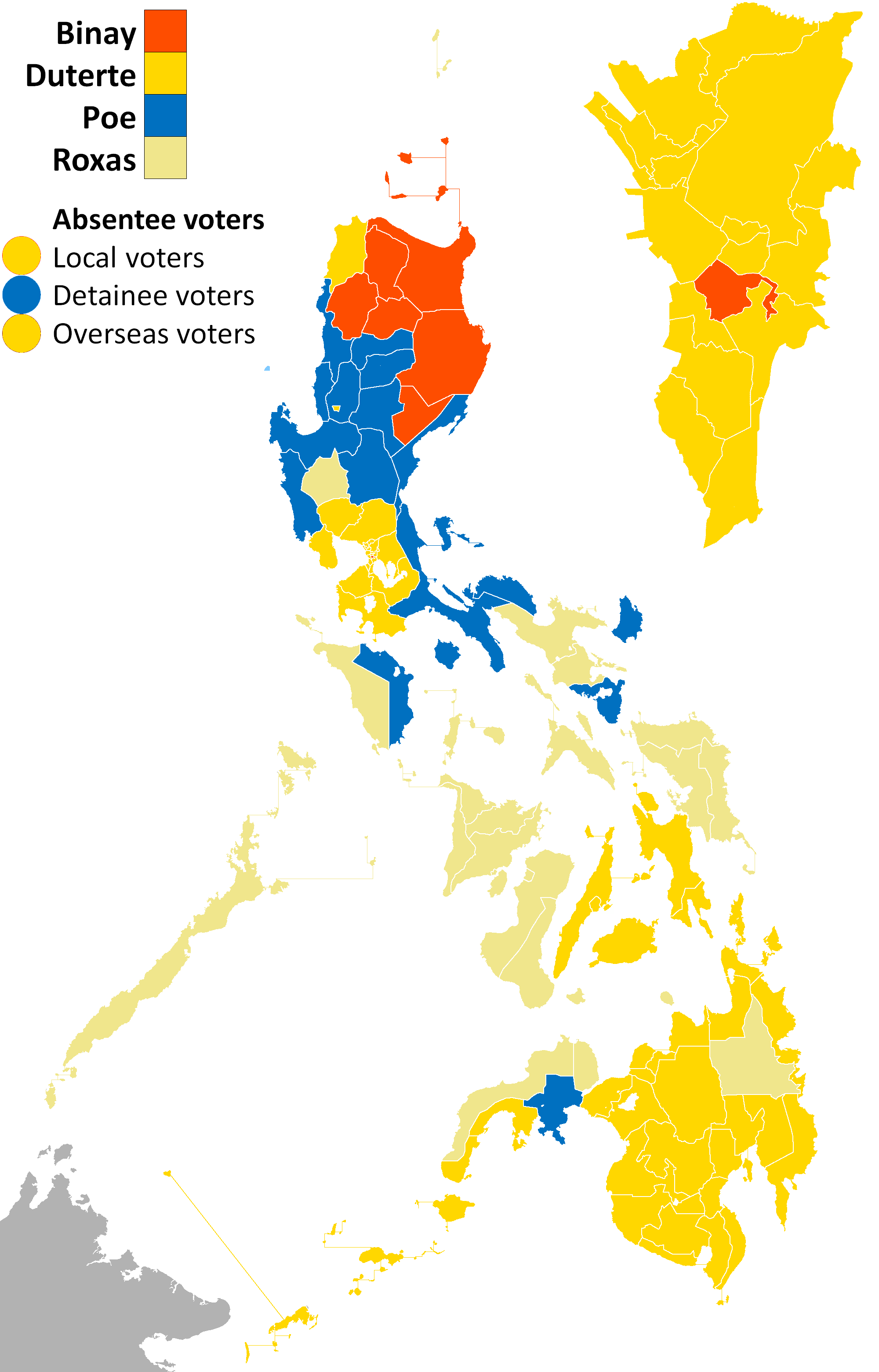|
17th Congress Of The Philippines
The 17th Congress of the Philippines ( fil, Ikalabimpitong Kongreso ng Pilipinas), composed of the Philippine Senate and House of Representatives, met from July 25, 2016, until June 4, 2019, during the first three years of Rodrigo Duterte's presidency. The convening of the 17th Congress followed the 2016 general elections, which replaced half of the Senate membership and the entire membership of the House of Representatives. Leadership Senate * Senate President: ** Koko Pimentel (PDP–Laban), July 25, 2016 – May 21, 2018 ** Tito Sotto ( NPC), May 21, 2018 – June 4, 2019 * Senate President ''pro tempore'': ** Franklin Drilon (Liberal), July 25, 2016 – February 27, 2017 ** Ralph Recto ( Nacionalista), February 27, 2017 – June 4, 2019 * Majority Floor Leader: ** Tito Sotto ( NPC), July 25, 2016 – May 21, 2018 ** Juan Miguel Zubiri (Independent), May 21, 2018 – June 4, 2019 * Minority Floor Leader: ** Ralph Recto (Liberal), July 25, 2016 – February 27, 2017 ** ... [...More Info...] [...Related Items...] OR: [Wikipedia] [Google] [Baidu] |
Rodrigo Duterte
Rodrigo Roa Duterte (, ; born March 28, 1945), also known as Digong, Rody, and by the initials DU30 and PRRD, is a Filipino lawyer and politician who served as the 16th president of the Philippines from 2016 to 2022. He is the chairperson of PDP–Laban, the ruling political party in the Philippines during his presidency. Duterte is the first president of the Philippines to be from Mindanao, and is the oldest person to assume office, beginning his term at age 71. Born in Maasin, Leyte (now in Southern Leyte), Duterte moved to Davao as a child where his father, Vicente Duterte, served as provincial governor. He studied political science at the Lyceum of the Philippines University, graduating in 1968, before obtaining a law degree from San Beda College of Law in 1972. He then worked as a lawyer and was a prosecutor for Davao City, before becoming vice mayor and, subsequently, mayor of the city in the wake of the 1986 People Power Revolution. Duterte won seven terms and s ... [...More Info...] [...Related Items...] OR: [Wikipedia] [Google] [Baidu] |
Pia Cayetano
Pilar Juliana Schramm Cayetano KGCR (born March 22, 1966), known as Pia Cayetano, is a Filipina politician and lawyer serving as a Senator since 2019, a position she previously held from 2004 to 2016. She was also the Representative of Taguig's 2nd district from 2016 to 2019 and was one of the Deputy Speakers. Cayetano was born to a political family currently based in Taguig. Her father was the late former senator Rene Cayetano; her younger brother, Alan Peter, is an incumbent senator who formerly represented Taguig-Pateros district and became Speaker of the House during the 18th Congress; another younger brother, Rene Carl, is a former councilor of Muntinlupa; her youngest brother, Lino, was mayor of Taguig; and her sister-in-law (Alan Peter's wife) Lani, is the incumbent mayor of Taguig. Cayetano authored the Expanded Senior Citizens Act, Expanded Breastfeeding Promoting Act, and the Responsible Parenthood and Reproductive Health Act of 2012, among others. She earne ... [...More Info...] [...Related Items...] OR: [Wikipedia] [Google] [Baidu] |
Deputy Speaker Of The House Of Representatives Of The Philippines
The deputy speakers of the House of Representatives of the Philippines are the second highest-ranking officials of the House of Representatives of the Philippines. During the absence of the Speaker of the House of Representatives of the Philippines, House speaker, one of the House deputy speakers will preside over the House of Representatives. From 17th Congress of the Philippines, 17th to 18th Congress of the Philippines, 18th Congress, the House increased the numbers of deputy speakers to cater the supposed move to federalism. , there are nine deputy speakers of the House of Representatives. Duties and powers The duties and powers of the House deputy speakers, as contained in the House rules, are the following: *to assume the duties and powers of the Speaker of the Philippine House of Representatives, speaker when so chosen by a majority vote or by lot among themselves, as the case may be, when the Speaker of the Philippine House of Representatives, Speaker is absent or tempora ... [...More Info...] [...Related Items...] OR: [Wikipedia] [Google] [Baidu] |
Legislative Districts Of Pampanga
A legislature is an assembly with the authority to make laws for a political entity such as a country or city. They are often contrasted with the executive and judicial powers of government. Laws enacted by legislatures are usually known as primary legislation. In addition, legislatures may observe and steer governing actions, with authority to amend the budget involved. The members of a legislature are called legislators. In a democracy, legislators are most commonly popularly elected, although indirect election and appointment by the executive are also used, particularly for bicameral legislatures featuring an upper chamber. Terminology The name used to refer to a legislative body varies by country. Common names include: * Assembly (from ''to assemble'') * Congress (from ''to congregate'') * Council (from Latin 'meeting') * Diet (from old German 'people') * Estates or States (from old French 'condition' or 'status') * Parliament (from French ''parler'' 'to speak') By ... [...More Info...] [...Related Items...] OR: [Wikipedia] [Google] [Baidu] |
Legislative Districts Of Davao Del Norte
The legislative districts of Davao del Norte are the representation of the province of Davao del Norte in the various national legislatures of the Philippines. The province is currently represented in the lower house of the Congress of the Philippines through its first and second congressional districts. History Prior to gaining separate representation, areas now under the jurisdiction of Davao del Norte were represented under the Department of Mindanao and Sulu (1917–1935) and the historical Davao Province (1935–1967). The enactment of Republic Act No. 4867 on May 8, 1967 split the old Davao Province into Davao del Norte, Davao del Sur and Davao Oriental. Per Section 4 of R.A. 4867, the incumbent Davao Province representative was to indicate which of the three new provinces he wished to continue to represent; Rep. Lorenzo Sarmiento chose to represent Davao del Norte. Davao del Sur (grouped together with Davao City) and Davao Oriental were separately represented beginning ... [...More Info...] [...Related Items...] OR: [Wikipedia] [Google] [Baidu] |
Speaker Of The House Of Representatives Of The Philippines
The speaker of the House of Representatives of the Philippines ( fil, Ispiker ng Kapulungan ng mga Kinatawan ng Pilipinas), more popularly known as the House speaker, is the presiding officer and the highest-ranking official of the lower house of Congress, the House of Representatives, as well as the fourth-highest official of the government of the Philippines. The speaker is elected by a majority of all of the representatives from among themselves. The speaker is the third and last in the line of succession to the presidency, after the vice president and the Senate president. A speaker may be removed from office in a coup, or can be replaced by death or resignation. In some cases, a speaker may be compelled to resign at the middle of a Congress' session after he has lost support of the majority of congressmen; in that case, an election for a new speaker is held. Despite being a partisan official, the speaker (or whoever is presiding) does not vote unless in breaking ties in a ... [...More Info...] [...Related Items...] OR: [Wikipedia] [Google] [Baidu] |
Koko Pimentel
Aquilino Martin de la Llana Pimentel III (born January 20, 1964), commonly known as Koko Pimentel, is a Filipino politician and lawyer serving as the Senate Minority Leader since 2022. He has been a Senator since 2011 and previously served as the Senate President of the Philippines from 2016 to 2018. He is also the national chairman of Partido Demokratiko Pilipino–Lakas ng Bayan (PDP–Laban). As the eldest son and third child of the former Senate President Aquilino Pimentel Jr., he is the first child of a previous Senate president to hold the office. He was sworn in on August 12, 2011, and was proclaimed as the 12th winning senator in the 2007 election. Pimentel was one of the high-ranking public officials who drew flak for breaching the COVID-19 quarantine protocols. Early life and education Aquilino Martin de la Llana Pimentel III was born on January 20, 1964, in Cagayan de Oro, Philippines. His parents are Aquilino Pimentel, Jr. and Lourdes de la Llana-Pimentel. His fat ... [...More Info...] [...Related Items...] OR: [Wikipedia] [Google] [Baidu] |
2016 Philippine General Election
A general election in the Philippines took place on May 9, 2016, for executive and legislative branches for all levels of government – national, provincial, and local, except for the barangay officials. At the top of the ballot was the election for successors to Philippine President Benigno Aquino III and Vice President Jejomar Binay. There were also elections for: * 12 seats to the Senate; * All 297 seats to the House of Representatives; * All governors, vice governors, and 772 seats to provincial boards for 81 provinces; * All mayors and vice mayors for 145 cities and for 1,489 municipalities; * All members of the city councils and 11,924 seats on municipal councils; and * Governor, vice governor and all 24 seats in the regional assembly of the Autonomous Region in Muslim Mindanao. The regional elections for the Autonomous Region in Muslim Mindanao (ARMM) were scheduled for May 9, but that would have changed if the Bangsamoro political entity had replaced the ARMM. The ... [...More Info...] [...Related Items...] OR: [Wikipedia] [Google] [Baidu] |
Congress Of The Philippines
The Congress of the Philippines ( fil, Kongreso ng Pilipinas, italic=unset) is the legislature of the national government of the Philippines. It is bicameral, composed of a lower body, the House of Representatives of the Philippines, House of Representatives, although colloquially the term "Congress" commonly refers to just the latter, and an upper body, the Senate of the Philippines, Senate. The House of Representatives meets in the Batasang Pambansa Complex, Batasang Pambansa in Quezon City while the Senate meets in the GSIS Building in Pasay. The Senate is composed of 24 senators half of which are elected every three years. Each senator, therefore, serves a total of six years. The senators are elected at-large and do not represent any geographical district. In the current 19th Congress of the Philippines, 19th Congress, there are 316 seats in the House of Representatives. The Constitution of the Philippines, Constitution states that the House "shall be composed of not more ... [...More Info...] [...Related Items...] OR: [Wikipedia] [Google] [Baidu] |
Rodrigo Duterte's Presidency
Rodrigo Duterte Inauguration of Rodrigo Duterte, became the List of presidents of the Philippines, 16th President of the Philippines on June 30, 2016, succeeding Benigno Aquino III. He was the first president from Mindanao, the first president to have worked in all three branches of government, and the oldest to be elected. He won 2016 Philippine presidential election, the election amid growing frustration with post-People Power Revolution, EDSA governance that favored elites over ordinary Filipinos. His tenure ended on June 30, 2022. Duterte began Philippine Drug War, a crackdown on illegal drugs and corruption in the Philippines, corruption, leading to a reduction in drug proliferation but also causing the deaths of 6,600 people linked to the Illegal drug trade in the Philippines, illegal drug trade as of July 2019. His administration States parties to the Rome Statute of the International Criminal Court, withdrew the Philippines from the International Criminal Court after t ... [...More Info...] [...Related Items...] OR: [Wikipedia] [Google] [Baidu] |
House Of Representatives Of The Philippines
The House of Representatives of the Philippines ( fil, Kapulungan ng mga Kinatawan ng Pilipinas, italic=unset, ''Kamara'' or ''Kamara de Representantes'' from the Spanish language, Spanish word ''cámara'', meaning "chamber") is the lower house of Congress of the Philippines, Congress, the bicameral legislature of the Philippines, with the Senate of the Philippines as the upper house. The lower house is usually called Congress, although the term collectively refers to both houses. Members of the House are officially styled as ''representative'' (''kinatawan'') and sometimes informally called ''congressmen'' or ''congresswomen'' (''mga kongresista'') and are elected to a three-year term. They can be re-elected, but cannot serve more than three consecutive terms except with an interruption of one term like the senate. Around eighty percent of congressmen are district representatives, representing a particular geographical area. The 19th Congress has 253 Congressional districts of ... [...More Info...] [...Related Items...] OR: [Wikipedia] [Google] [Baidu] |
Philippine Senate
The Senate of the Philippines (Filipino language, Filipino: ''Senado ng Pilipinas'', also ''Mataas na Kapulungan ng Pilipinas'' or "upper chamber") is the upper house of Congress of the Philippines, Congress of the bicameral legislature of the Philippines with the House of Representatives of the Philippines, House of Representatives as the lower house. The Senate is composed of 24 senators who are Philippine senatorial elections, elected at-large (the country forms one district in its elections) under plurality-at-large voting. Senators serve six-year terms with a maximum of two consecutive terms, with half of the senators elected in staggered elections every three years. When the Senate was restored by the Constitution of the Philippines, 1987 Constitution, the 24 senators who were elected in 1987 served until 1992. In 1992 the 12 candidates for the Senate obtaining the highest number of votes served until 1998, while the next 12 served until 1995. Thereafter, each senator elec ... [...More Info...] [...Related Items...] OR: [Wikipedia] [Google] [Baidu] |









